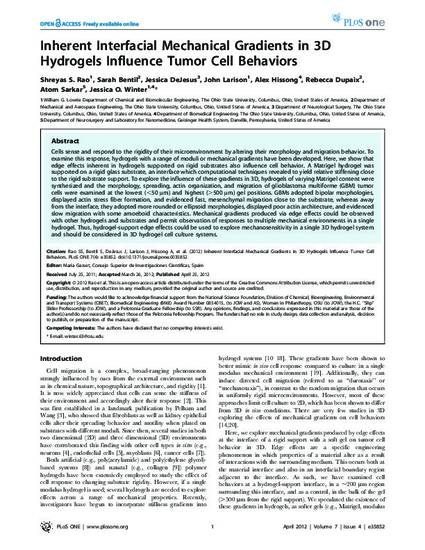
Article
Inherent Interfacial Mechanical Gradients in 3D Hydrogels Influence Tumor Cell Behaviors
PLoS ONE
(2012)
Abstract
Cells sense and respond to the rigidity of their microenvironment by altering their morphology and migration behavior. To examine this response, hydrogels with a range of moduli or mechanical gradients have been developed. Here, we show that edge effects inherent in hydrogels supported on rigid substrates also influence cell behavior. A Matrigel hydrogel was supported on a rigid glass substrate, an interface which computational techniques revealed to yield relative stiffening close to the rigid substrate support. To explore the influence of these gradients in 3D, hydrogels of varying Matrigel content were synthesized and the morphology, spreading, actin organization, and migration of glioblastoma multiforme (GBM) tumor cells were examined at the lowest (<50 µm) and highest (>500 µm) gel positions. GBMs adopted bipolar morphologies, displayed actin stress fiber formation, and evidenced fast, mesenchymal migration close to the substrate, whereas away from the interface, they adopted more rounded or ellipsoid morphologies, displayed poor actin architecture, and evidenced slow migration with some amoeboid characteristics. Mechanical gradients produced via edge effects could be observed with other hydrogels and substrates and permit observation of responses to multiple mechanical environments in a single hydrogel. Thus, hydrogel-support edge effects could be used to explore mechanosensitivity in a single 3D hydrogel system and should be considered in 3D hydrogel cell culture systems.
Disciplines
Publication Date
April 25, 2012
DOI
10.1371/journal.pone.0035852
Publisher Statement
© 2012 Rao et al. This is an open-access article distributed under the terms of the Creative Commons Attribution License, which permits unrestricted use, distribution, and reproduction in any medium, provided the original author and source are credited.
Citation Information
Shreyas S. Rao, Sarah A. Bentil, Jessica DeJesus, John Larison, et al.. "Inherent Interfacial Mechanical Gradients in 3D Hydrogels Influence Tumor Cell Behaviors" PLoS ONE Vol. 7 Iss. 4 (2012) p. e35852 Available at: http://works.bepress.com/sarah-bentil/1/
Creative Commons license

This work is licensed under a Creative Commons CC_BY International License.
